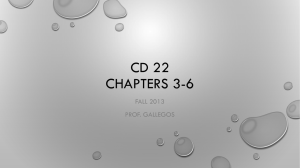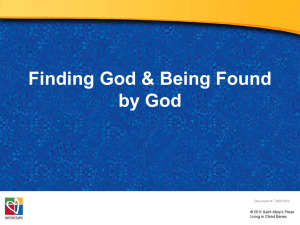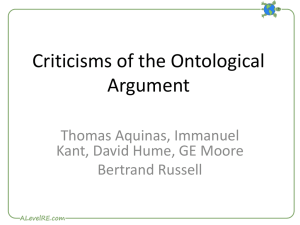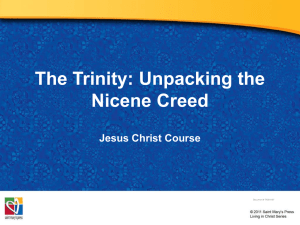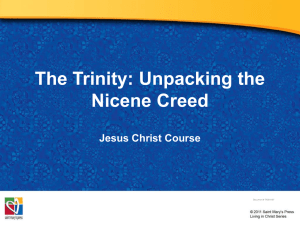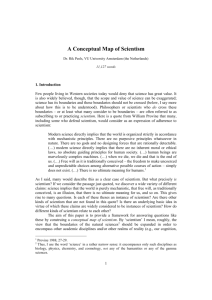Knowing God through Natural Revelation, Reason, and Faith
advertisement
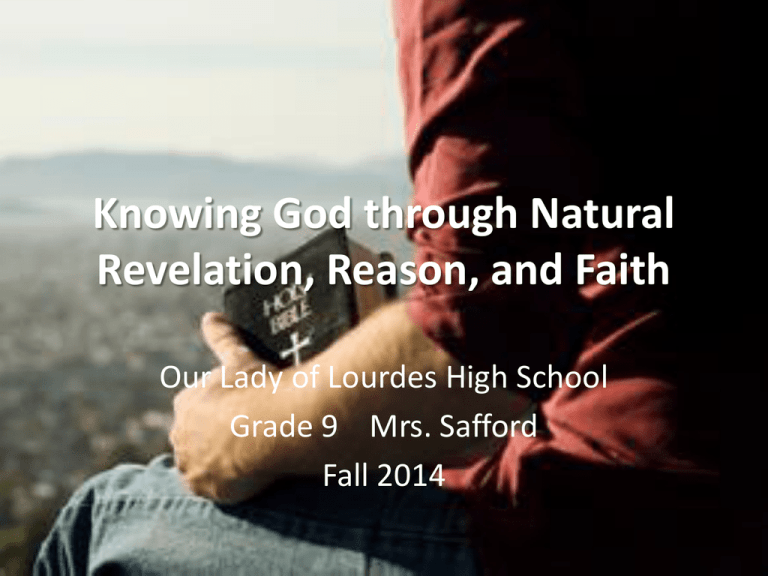
Knowing God through Natural Revelation, Reason, and Faith Our Lady of Lourdes High School Grade 9 Mrs. Safford Fall 2014 Nicene Creed History • The Nicene Creed is the only creed accepted by all three major branches of Christianity: Orthodox, Roman Catholic, and Protestant. • It was adopted by a general Council of the entire Church (Ecumenical) in 325 A.D., and revised by a general council of the entire Church in 381 A.D. • Video: What is a Creed? • Video: History of the Nicene Creed Nicene Creed I believe in one God, the Father almighty, maker of heaven and earth, of all things visible and invisible. I believe in one Lord Jesus Christ, the Only Begotten Son of God, born of the Father before all ages. God from God, Light from Light, true God from true God, Begotten, not made, consubstantial with the Father; Through him all things were made. For us men and for our salvation, he came down from heaven, and by the Holy Spirit was incarnate of the Virgin Mary, and became man. Nicene Creed (cont.) For our sake he was crucified under Pontius Pilate, He suffered death and was buried, and rose again on the third day in accordance with the Scriptures. He ascended into heaven and is seated at the right hand of the Father. He will come again in glory to judge the living and the dead and his kingdom will have no end. I believe in the Holy Spirit, the Lord, the giver of life, who proceeds from the Father and the Son, who with the Father and the Son is adored and glorified, who has spoken through the prophets. I believe in one, holy, catholic, and apostolic Church. I confess one baptism for the forgiveness of sins and I look forward to the resurrection of the dead and the life of the world to come. Amen! KNOWING GOD THROUGH REASON Questions to Think About… • What is natural religion? • What are the two fundamental ways of knowing God? What is natural religion? • Each human being is born with a natural desire for God, which is answered in the natural capacity to know God through reason. • God’s supernatural desire is for us to live in communion with him, so he reaches out and enables people to find him. • Video: The Desire for God What are the two fundamental ways of knowing God? • The fundamental ways of knowing God are through reason and revelation. • Human reason can lead one to realize God exists. It can even tell us some about his divine nature. • Plato and Aristotle (pagan philosophers), using reason alone, concluded that there was one God, and he must be eternal and perfect. Vocabulary Define on a piece of paper the following words: • Agnosticism • Atheism • Dogma • Faith • Natural Law • Natural Revelation • Reason • Religious Being • Revelation • Science This will count as a homework grade KNOWING GOD THROUGH NATURAL REVELATION Questions to Think About… • What is natural knowledge of God? • Who is Saint Thomas Aquinas? • What are the five ways that Saint Thomas Aquinas wrote to prove the existence of God? What is natural knowledge of God? • A person can discover the existence of God and some of his attributes by reason from the things he has created. • Video: Does God Exist? What are the five ways to prove the existence of God? Video: Five Proofs of the Existence of God Saint Thomas Aquinas offers 5 ways to prove the existence of God based on reason: 1. First Mover 2. Everything has a cause 3. Possibility and Necessity 4. Perfection 5. Governance Homework • Write a creative letter to someone who is an Atheist by using the five ways that Saint Thomas Aquinas proved that God exists. Remember to use examples to support each of the five reasons. This will count as a quiz grade. SCIENCE AND REASON Questions to Think About… • What is the relationship between science and reason? • What is scientism? • Can modern science support the idea of God? • What are the principle errors regarding the existence of God? What is the relationship between science and reason? • Science is a particular, highly successful form of reasoning, but it is only a portion of what can be known through reason. What is scientism? • Scientism is a view that reduces knowledge to what can be known through the methods of science. Can modern science support the idea of God? • The findings of modern science can be the grounds for philosophical reflection, which can lead to a belief in God. What are the principle errors regarding the existence of God? • Some principle errors regarding the existence of God are: 1.Atheism 2.Agnosticism 3.Rationalism 4.Fideism Atheism • It is the denial of the existence of God. • Video: Answering Atheism Agnosticism • Believes that the existence of God can not be proven. • Agnostics believe that faith is irrational because they believe that human reason must confine itself to those truths that are observable to the human senses. Rationalism • Strict rationalists believe that they should judge everything solely and exclusively to philosophical or scientific reason. Fideism • Accepts religious beliefs without grasping their intellectual content, without seeing the reason which make them believable, without seeing their connection with other realities, and without acknowledging the right to intellectual life to which faith is entitled. A Love Letter from God • Video: A Love Letter from God Citations for this Chapter from You Tube: • A Love Letter from God. Author: God Loves You. http://youtu.be/BJMy5X4tq-E • Answering Atheism. Author: Christopher Stefanick. http://youtu.be/9hU38OPq1qk • Five Proofs of the Existence of God. Author: tcuburr. http://youtu.be/-XhMy79k4gA • C4 Ignite Your Faith-The Desire for God. Author: Archdiocese of Milwaukee with Bishop Don Hying. What is a Creed? http://youtu.be/kVnOoF808rQ Does God Exist? http://youtu.be/Ndf9OoDooLU The Desire for God http://youtu.be/3w6AVuuPXAQ Citations for this Chapter • History of the Nicene Creed. Massengell, C., et al. Published on March 10,2013 http://youtu.be/BfYxt6Jx_do Book: Armenio, Rev. Peter. Faith and Revelation: Knowing God through Sacred Scripture. 1st ed. Woodridge: Midwest Theological Forum, 2009. Pictures were taken from various sources via Google images.



